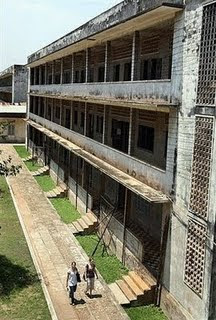The MFAIC rejection came following Mu Sochua’s claim that human rights and democracy in Cambodia is worsening. She alleged that the kingdom’s court system is not just, as she lost a defamation case against Cambodian Prime Minister Hun Sen.
MFAIC Secretary of State Uch Borith revealed details of a meeting with the US ambassador in Phnom Penh about Mu Sochua’s remarks.
“According to the ambassador, it was not a formal and bilateral talk between Mu Sochua and US Foreign Secretary Hillary Clinton [but] was just a meeting by chance in the street, out of the office,” he told reporters.
“Mu Sochua had asked the US Government to send a delegation to Cambodia to study and investigate democracy and human rights in Cambodia, but the response from the US foreign minister was negative,” he claimed. Uch Borith stated that the opposition lawmaker’s remarks would have no effect on cooperation between the US and Cambodia. “It means Mu Sochua told lies, not only to the Cambodian people, but also to the world,” he said.
The minister clarified that the security of Mu Sochua will be ensured. “If our Government was a dictatorship, she could not have left Cambodia.”
The Commission of Foreign Affair, International Cooperation, and Infor- mation of the Cambodian National Assembly (NA) on Monday dismissed remarks made by Mu Sochua, a Sam Rainsy Party lawmaker (SRP ), at the Human Commission of Tom Lantos.
“Removing the parliamentary immunity of Mu Sochua and Ho Vann followed by Article 80 and 88 of the Cambodian Constitution and Article 8 to 12 of the 2006 Lawmaker Statute,” noted the NA statement.
“We reject and dismiss the remarks of Mu Sochua,” the statement said. “Sam Rainsy himself did not acknowledge election result and refused to attend 9 commissions of the NA.”
The NA disagreed with Human Right Commission of Tom Lantos, which apparently only invited Cambodian opposition officials, not allowing members of the Cambodian Government to attend. This action, said the NA, showed that the event was undemocratic and unbalanced. It could put strain on the relationship between Cambodia and US.
Meanwhile, the NA welcomed and supported US Assembly Foreign Affair Commission Director Eni F.H. Faleomavaega, saying he knew the real democracy of Cambodia.
After she lost her case against premier Hun Sen at the Phnom Penh Municipal Court, Mu Sochua filed with the Appeal Court, and then travelled to the US to try to publicize the situation in Cambodia.
Source: dap-news.c0m


 Writer: BangkokPost.com
Writer: BangkokPost.com




